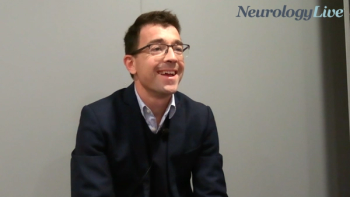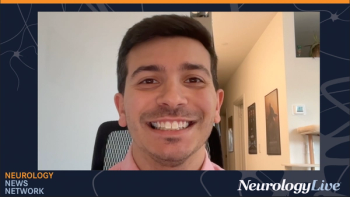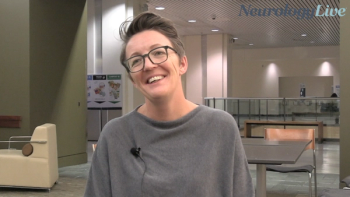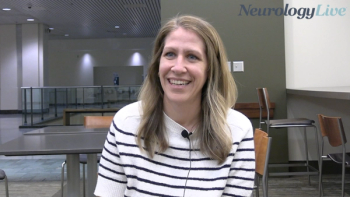
Findings revealed that vitamin D deficiency was associated with an increased risk of NMOSD in East Asian populations, whereas the effect of smoking among Caucasians and other populations was inconsistent.

Findings revealed that vitamin D deficiency was associated with an increased risk of NMOSD in East Asian populations, whereas the effect of smoking among Caucasians and other populations was inconsistent.

The FDA has approved Novartis’ intrathecal formulation of onasemnogene abeparvovec-brve, marketed as Itvisma, for patients ages 2 years and older living with spinal muscular atrophy.

Results from the EVOKE and EVOKE+ phase 3 studies reported that oral semaglutide did not significantly reduce clinical progression in patients with early symptomatic Alzheimer disease.

Natalizumab-sztn is an FDA-approved monotherapy for all indications of the reference product natalizumab, including relapsing forms of multiple sclerosis and Crohn disease.

Encouraging data from the OCEANIC-STROKE study suggest that asundexian may soon join the therapeutic landscape for secondary stroke prevention as Bayer advances toward submission.

Here's some of what is coming soon to NeurologyLive® this week.

The neurologist at the Multiple Sclerosis Center of Catalonia talked about the challenges of defining seronegative in new diagnostic criteria for neuromyelitis optica spectrum disorder [WATCH TIME: 5 minutes]

Test your neurology knowledge with NeurologyLive®'s weekly quiz series, featuring questions on a variety of clinical and historical neurology topics. This week's topic is neural network plasticity after stroke!

A recent study confirms satralizumab's long-term safety and efficacy for treating neuromyelitis optica spectrum disorder, supporting its use as a maintenance therapy.

A case report reveals cognitive decline and brain atrophy in a patient with NMOSD, highlighting potential subclinical neurodegeneration despite limited relapses.

Neurology News Network for the week ending November 22, 2025. [WATCH TIME: 4 minutes]

Take 5 minutes to catch up on NeurologyLive®'s highlights from the week ending November 21, 2025.

The senior director of research and real world data at Genome Medical talked about the benefits and challenges of genetic counselors adopting artificial intelligence tools. [WATCH TIME: 5 minutes]

Acumen Pharmaceuticals initiates a phase 2 trial extension for sabirnetug, targeting early Alzheimer disease and aiming for long-term safety insights.

The chief medical officer at Ventyx Biosciences provided commentary on early clinical findings supporting NLRP3 inhibition with VTX3232 as a potential disease-modifying approach for Parkinson disease. [WATCH TIME: 4 minutes]

A recent trial reveals that online cognitive training and other interventions are ineffective for treating long COVID cognitive symptoms, highlighting treatment challenges.

Daniel Mikol, MD, PhD, vice president of neuroscience development at AbbVie, discussed how precision tools, AI, and patient partnership are reshaping the design and execution of modern neuroscience clinical trials.

The genetic counselor in the Department of Ophthalmology at the University of Pittsburgh Medical Center talked about the evolving role of genetic counselors in guiding patients through gene therapy. [WATCH TIME: 4 minutes]

KYV-101 shows promising efficacy in treating generalized myasthenia gravis, offering hope for durable remission through innovative CAR T-cell therapy.

In a newly published study, researchers developed expert-driven, evidence-based, up-to-date consensus recommendations for managing neuromyelitis optica spectrum disorder in Saudi Arabia.

The medical director of the stroke recovery program at Hackensack Meridian Health JFK Johnson Rehabilitation Institute provided clinical insights into her presentation focused on expanding rehab care for stroke survivors across settings. [WATCH TIME: 5 minutes]

Vaishal Shah, MD, MPH, FAASM, FAAP, center director of the Sleep Disorders Center at Cleveland Clinic, spoke on the changes in how obstructive sleep apnea is treated, moving away from CPAP to more novel approaches.

Ryan Donaghy, MD, an assistant professor of neurology at Northwestern Medicine, discussed the evolving landscape of ALS clinical trials, including advances in biomarkers, genetics, and modern trial design.

At ECTRIMS 2025, the associate professor at Pontifical Catholic University of Chile discussed global challenges in diagnosing multiple sclerosis early. [WATCH TIME: 5 minutes]

At MDS 2025, the professor of neurology at Northwestern University Feinberg School of Medicine discussed the evolving landscape of disease-modifying clinical trials in Parkinson disease.

Carrie Haverty, MS, CGC, NSGC president-elect, discusses the evolving role of genetic counselors, emphasizing personalized care, gene therapy advancements, and the need for multidisciplinary integration in health care.

Results of a new study funded by the ALS Association showed that the global prevalence of patients living with amyotrophic lateral sclerosis may increase by 25% by 2040.

At MDS 2025, the lead specialist for patient insights at Lundbeck spoke about the importance of considering patient and caregiver voices when designing clinical trials. [WATCH TIME: 3 minutes]

The chief medical officer at Dyne Therapeutics highlighted z-rostudirsen’s ability to restore dystrophin and improve function across DMD severity levels, setting the stage for a potential 2026 accelerated approval. [WATCH TIME: 4 minutes]

Naji Gehchan, MD, MSc, chief medical and development officer Kyverna, discussed how KYV-101 may redefine generalized myasthenia gravis care through deep B-cell depletion and durable, drug-free remission.